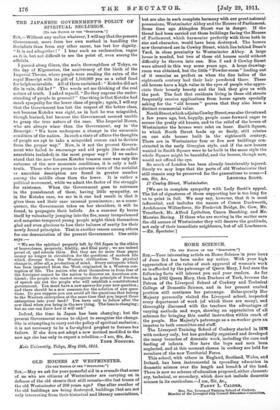THE JAPANESE GOVERNMENT'S- POLICY OF SPIRITUAL SECLUSION.
[To THE EDITOR OP TEE "SPECTATOR."] Sin,—Without any malice whatever, I will say that the present Government, more from her own method in handling the
Socialists than from any other cause, has lost her dignity. "It is sad altogether !" I hear such an exclamation, vague as it is, but not difficult to see the point of, even among the officials.
I passed along Ginza, the main thoroughfare of Tokyo, on the day of Kigensetsu, the anniversary of the birth of the Imperial Throne, where people were reading the extra of the royal Rescript with its gift of 1,500,000 yen as a relief fund for helpless invalids. All of them exclaimed : " Kotoku did not die in vain, did he ? " The words set me thinking of the real nature of truth. I asked myself, " Do they express the under- standing of people in general ? " One thing is that Kotoku had much sympathy for the lower class of people ; again, I will say that the Government has lost the respect of the better class, not because Kotoku was right, as in fact he was misguided, though learned, but because the Government seemed unable to grasp the true nature of the case. The Imperial House, who are always wiser than the Government, say in • the Rescript : " We have undergone a change in the economic condition of the nation. In such a state of affairs the thoughts of people are apt to take a misguided course and to deviate from the proper way." Now, is it not the present Govern- ment who failed to encourage and aid people (the so-called anarchists included) in the most proper way ? If we under- stand that the now famous Kotoku treason case was only the outcome of the new economic conditions, it is only a half- truth. Those who are prone to extreme views of the socialist or anarchist description are found in greater number among the middle class than the lower. It is rather a political movement, while we admit the factor of the struggle for existence. When the Government goes to extremes in the punishment of them, having little sympathy, as in the Kotoku case, we see in it one bad result in that it gives them and their case unusual prominence ; as a conse- quence, the Government takes on her shoulders, it will be found, to propagate their beliefs. As a summer fly burns itself by voluntarily jumping into the fire, many inexperienced and sanguine-tempered young people might think themselves
glad and even glorious to lose their balance of sanity for their newly found principles. That is another reason among others
for our denunciation of the present Government. One critic says :—
" We see the spiritual property left by Old Japan in the ethics of benevolence, propriety, fidelity, and filial piety ; we are indeed proud of, and esteem them. But they are no more than paper money no longer in circulation for the questions of modern life which diverge from the Western civilization. The physical change is, after all, a production of mind. Every enterprise which has been imported from the West originated in a Western con- ception of life. The nation who shut themselves in from fear of the foreigner cannot be the nation to discover an American con- tinent; the people who cannot recognize the principle of freedom of speech are not the people who will establish a constitutional government. You must have a new answer for your new question ; and there should be a new measure for the solution of new ques- tions. Do you suppose you can avoid all the questions that belong to the Western enterprises at the same time that you import those enterprises into your land ? You have only to follow after the new ideal when you bring in the new thing. The time is changing ; but no one can know how it will end."
Indeed, the time in Japan has been changing ; but the
present Government seems to object to recognize the change. She is attempting to carry out the policy of spiritual seclusion ; it is not necessary to be a far-sighted prophet to foresee her failure. If she does not adopt a new method modified to the new age she has only to expect a rebellion.—I am, Sir, &c., YOKE Nooucar.
Xeio University, Tokyo, May 25th, 1911.






































 Previous page
Previous page